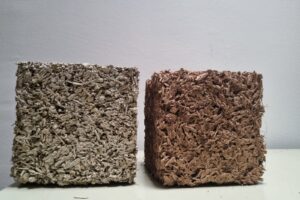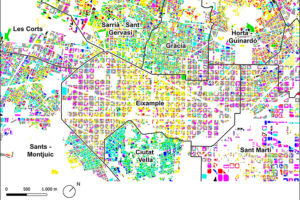
LIFE BIOGASNET: A new cost-effective and low-carbon biogas purification technology
October 29, 2024
GAISSA: An energy card to assess and improve energy efficiency and performance of AI
November 21, 202429/10/2024
The adoption of 6G applications will have a positive impact, transforming our society in the future. Among these are the use of autonomous vehicles and the potential to reduce accidents, more efficient emergency services, and connected drones that facilitate the delivery of medical supplies between healthcare centres. The implementation of these new technologies requires test infrastructures that closely mimic real environments to ensure their subsequent application.
In this context, several research groups from the CCABA (Advanced Broadband Communications Center), CER (Specific Research Centre) at the Universitat Politècnica de Catalunya - BarcelonaTech (UPC) are working on the ELEGANT and 6G-OpenLab projects, which aim to create a research and experimental environment dedicated to the development and testing of sustainable infrastructures.
To achieve this, a 6G hybrid network will be built, combining a high-capacity fibre optic network with an evolvable 5G+ mobile network, enabling the transition towards 6G to support mobility and artificial intelligence projects. This advancement will be made possible by integrating multi-technology systems, dual 5G networks (with two frequency bands, reaching up to 26 GHz), expanded mobile networks, and ultra-low latency capabilities. All of this will be implemented through flexible and scalable systems capable of adapting to the growth demands that 6G applications require. A unique feature of this infrastructure is its network distributed across two UPC campuses 32 km apart: the North Campus in Barcelona and the Castelldefels Campus.
A multidisciplinary team of several UPC research groups will bring their expertise to tackle these complex challenges, as it involves a hybrid network of optical communications and mobile networks. This complexity will facilitate the development of ambitious projects such as the 6G-EWOC autonomous vehicles initiative, as well as the intelligent crop control project in the Agròpolis area. This testbed will be available to companies and organisations upon request from early 2026.
The total budget for both projects amounts to 4 million euros, funded through European Funds channelled via the ÚNICO 5G I+D programme of the Ministry for Digital Transformation and Public Administration. The ELEGANT project began in April 2023 and the 6G-OpenLab in September 2022, with completion expected by 2026.






Related Projects
- The La Volta project foresees the construction of a large Catalan vault pergola within the Llars Mundet campus, in the Montbau neighbourhood (Horta-Guinardó district). This structure will become a new architectural landmark for Barcelona, combining traditional construction techniques with contemporary innovation. The project involves the Rehabilitation and Architectural Restoration Research Group (REARQ), at the Universitat Politècnica de Catalunya - BarcelonaTech (UPC), and is led by the Architects’ Association of Catalonia (COAC) and the Barcelona Provincial Council.
SATE-VEG: A system for energy renovation of buildings that helps reduce the urban heat island effect
Researchers from the Architecture, Energy and Environment (AiEM) group at the Universitat Politècnica de Catalunya - BarcelonaTech (UPC) have developed SATE-VEG, an external thermal insulation system with a vegetal coating that offers seasonally adaptive thermal behaviour, enhances urban biodiversity and promotes positive health effects. The system is made from organic materials, requires low maintenance and consumes minimal water.- A research team from the Interdisciplinary Group on Building Science and Technology (GICITED) at the Universitat Politècnica de Catalunya – BarcelonaTech (UPC) is leading the BioSAFE project, which aims to develop sustainable building envelopes —mainly façades— designed according to sustainability, comfort and safety criteria, with particular attention to their acoustic behaviour and fire performance.
- The Architecture, Energy and Environment (AiEM) research group at the Universitat Politècnica de Catalunya - BarcelonaTech (UPC) has characterised Barcelona’s residential buildings according to their capacity to adapt to climate change. This study is part of the project ‘VeUvE: Urban havens for vulnerable zones’. The work highlights the climate inequality conditions present across different areas of the city and will help to better define the priorities and energy renovation strategies for its districts.





